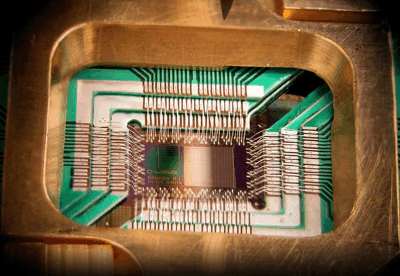| $100,000 Prize For Proving Quantum Computers Are Impossible |
| Written by Mike James | |||
| Saturday, 04 February 2012 | |||
|
Quantum computing is currently a major area of research - but is this all a waste of effort? A prize of $100,000 has been offered for any proof that quantum computers are impossible. One of the problems with quantum computers, and quantum computing in general, is that we all assume that it is possible. From an initial modest beginning, quantum computing has grow to be a major research, and even commercial, concern. Of course quantum computers are realizable, we just have to wait for the technology to catch up with the theory. This is certainly the attitude you will find in most of the media, and there are even deep philosophical accounts of what the world will be like when quantum computing finally arrives. Many of the discussions even blur the line to the point where the reader is left with the opinion that it has happened already.
In the real world, however, there are quite a few quantum computing skeptics who hold that it isn't the technology that is the problem, but the theory. Quantum mechanics might be weird, but perhaps it isn't weird enough to let us gain the advantages of a quantum computer. The argument is there might be some mechanism in action, similar to that found in thermodynamics, which rules out a perpetual motion machine. If you don't know about the Second Law of Thermodynamics then you can waste a lot of time trying to create a perpetual motion machine. Once you know and understand the second law, you can move on and try to invent something that might work. The question is are we wasting our time with quantum computers because there is a law which says that they can't do any better than a conventional computer? This is a question that has been troubling the quantum computing community for some time with the doubters being in the minority. Now the issue has broken surface in a more public way in the form of a debate Perpetual Motion of The 21st Century? on the blog Godel's Lost Letter and P=NP. The title of the post is because one possible way that quantum computing could fail is that it handles noise in a way that is different to conventional computers - and this is a decidedly thermodynamic issue. Now Scott Arronson a well known MIT computer scientist has offered a prize of $100,000 for any proof that quantum computers are impossible: "I’m now offering a US$100,000 award for a demonstration, convincing to me, that scalable quantum computing is impossible in the physical world." Notice the two important conditions - "physical world" and "scalable". The proof doesn't have to rule out tiny "toy" quantum computers, only those that could do any useful work. This is not a prize for proving a negative because having an understanding of a law that made quantum computing impossible would be a big step forward in our understanding of the world. It would illuminate the way quantum mechanics effects our reality. While quantum mechanics accurately explains the weird behaviour of microscopic particles. we see none of this weirdness at the macro level. In other words, the world that we experience is free of quantum weirdness. Building a quantum computer would change this because, for example, we would have a macro object that could factor integers faster than any "normal" computer could. The quantum computer would be a macro object which had observable quantum weirdness - as something that can give a result faster than a Turing machine could. Such an object might not have any right to exist.
More InformationPerpetual Motion of The 21st Century? Whether or not God plays dice, I do How quantum computers fail: Quantum codes
Comments
or email your comment to: comments@i-programmer.info
To be informed about new articles on I Programmer, subscribe to the RSS feed, follow us on Google+, Twitter, Linkedin or Facebook or sign up for our weekly newsletter.
|
|||
| Last Updated ( Thursday, 10 December 2015 ) |


